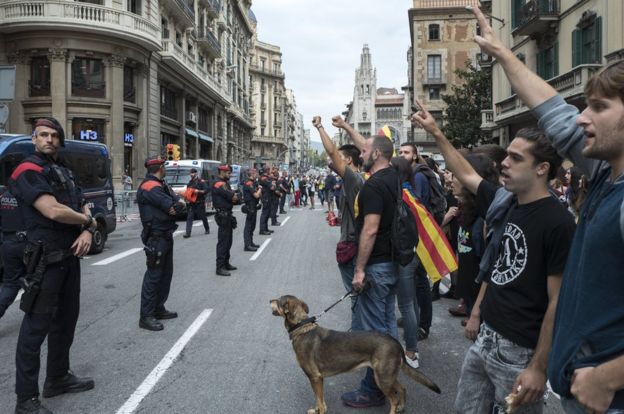Catalonia will declare independence from Spain in a matter of days, the leader of the autonomous region has told the BBC.
In his first interview since Sunday’s referendum, Carles Puigdemont said his government would “act at the end of this week or the beginning of next”.
Meanwhile, Spain’s King Felipe VI said organisers of the vote put themselves “outside the law”.
He said the situation in Spain was “extremely serious”, calling for unity.
Hundreds of thousands of people across Catalonia have been protesting over Spanish police violence during the vote, during which nearly 900 people were hurt.
During the vote, 33 police officers were also injured, local medical officials said.
In the BBC interview, Catalonia’s President Carles Puigdemont said his government would “act at the end of this week or the beginning of next”.
When asked what he would do if the Spanish government were to intervene and take control of Catalonia’s government, Mr Puigdemont said it would be “an error which changes everything”.
Mr Puigdemont said there was currently no contact between the government in Madrid and his devolved administration.
He disagreed with the European Commission’s statement on Monday that events in Catalonia were an internal issue for Spain.
He was speaking shortly before the king’s speech.
In his televised address to the nation, the king said the Catalan leaders who organised the referendum showed their “disrespect to the powers of the state”.
“They have broken the democratic principles of the rule of law.
“Today, the Catalan society is fractured,” the king said, warning that the poll could put at risk the economy of the wealthy north-eastern region and the whole of Spain.
But he stressed that Spain “will overcome difficult times”.
The central government has described the referendum as illegal.
When the speech ended, customers in this city centre bar thumped tables and whistled contemptuously, then quickly resumed normal conversation – King Felipe may as well have not spoken.
It was the things he omitted that rankled – no words about those shocking scenes of police beating voters on Sunday, no urgent appeal for dialogue between the Spanish and Catalan governments, no acknowledgment of the real hunger here for independence or at least a proper, legal referendum, not even a word or two of Catalan.
Instead, he expressed the position of the government, echoing its firm opposition to the vote, saying Catalan leaders had positioned themselves outside the law. He guaranteed “democratic coexistence” on Spanish terms only.
It was a missed opportunity to push the two sides towards dialogue, one customer told me afterwards.
“It doesn’t help the situation at all,” said another. “I was not expecting him to intervene at all, actually, but he should at least have mentioned the violence here two days ago.”
Huge protest rallies have been taking place across Catalonia.
In Barcelona alone, 700,000 people took to the streets, city police were quoted as saying by the AFP news agency.
This has not been confirmed by the authorities in Madrid.
More than 50 roadblocks in the city caused big traffic jams. Barcelona’s metro traffic was cut to a 25% service during rush hour and no trains at all at other times.
Barcelona’s port was at a standstill, trade union sources said.
Top tourist attractions were also closed, including the city’s famous Sagrada Familia church.
Mercabarna – Barcelona’s massive wholesale market – was left deserted as some 770 food businesses closed for the day.
However, the city’s El Prat airport and its taxis are operating normally.
Many small businesses have shut for the day. Schools, universities and medical services were also closed or operating at a minimum level.
BBC
 Q FM Africa's Modern Radio
Q FM Africa's Modern Radio
